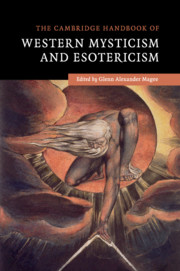Book contents
- Frontmatter
- Dedication
- Contents
- Acknowledgments
- Editor's Introduction
- List of contributors
- I ANTIQUITY
- II THE MIDDLE AGES
- III THE RENAISSANCE AND EARLY MODERNITY
- 12 Renaissance Hermetism
- 13 Christian Kabbalah
- 14 Paracelsianism
- 15 Rosicrucianism
- 16 Jacob Boehme and Christian Theosophy
- 17 Freemasonry
- 18 Swedenborg and Swedenborgianism
- 19 Mesmer and Animal Magnetism
- IV THE NINETEENTH CENTURY AND BEYOND
- V COMMON THREADS
- Suggestions for Further Reading
- Index
- References
13 - Christian Kabbalah
from III - THE RENAISSANCE AND EARLY MODERNITY
Published online by Cambridge University Press: 05 May 2016
- Frontmatter
- Dedication
- Contents
- Acknowledgments
- Editor's Introduction
- List of contributors
- I ANTIQUITY
- II THE MIDDLE AGES
- III THE RENAISSANCE AND EARLY MODERNITY
- 12 Renaissance Hermetism
- 13 Christian Kabbalah
- 14 Paracelsianism
- 15 Rosicrucianism
- 16 Jacob Boehme and Christian Theosophy
- 17 Freemasonry
- 18 Swedenborg and Swedenborgianism
- 19 Mesmer and Animal Magnetism
- IV THE NINETEENTH CENTURY AND BEYOND
- V COMMON THREADS
- Suggestions for Further Reading
- Index
- References
Summary
GERSHOM SCHOLEM ARGUES THAT THE PRIMARY MOTIVATION for Christian kabbalists was a form of missionary activity: “Christian Kabbalah can be defined as the interpretation of kabbalistic texts in the interests of Christianity (or, to be more precise, Catholicism); or the use of kabbalistic concepts and methodology in support of Christian dogma.” As evidence, he points to the Christological speculations of Jewish converts, such as the Pugio Fidei (Dagger of Faith) of Raymund Martini (1220–1285), works that contributed to the growth of an incipient Christian Kabbalah.
Giovanni Pico della Mirandola and the Dawn of Christian Kabbalah
Although the Majorcan mystic Ramon Lull (1225–1315) is sometimes credited with being the first Christian to show an acquaintance with Kabbalah in his De auditu Kabbalistico, the work actually shows little familiarity with the Jewish tradition. Christian speculation about the Kabbalah first took root in the Florentine Renaissance. While Marsilio Ficino (1433–1499) was busy translating and writing commentaries on the works of Plato, Plotinus, and Hermes Trismegistus, Giovanni Pico della Mirandola (1463–1494) began studying kabbalistic works. This was all part of Pico's project of creating his syncretic philosophia nova, his synthesis of Aristotelian and Platonic thought with esoteric doctrines gleaned from prisci theologi such as Zoroaster, Orpheus, Hermes Trismegistus, and Pythagoras. Pico is the first author raised as a Christian who is known to have read an impressive amount of genuine Jewish Kabbalah. He marks a watershed in the history of Hebrew studies in Europe.
The fruit of Pico's studies can best be found in his famous nine hundred Conclusiones Philosophicæ Cabalisticæ et Theologicæ (1486). It was here that Pico first introduced the Kabbalah into the mainstream of Renaissance thought by means of forty-seven “Cabalistic Conclusions” according to “the secret teaching of the wise Hebrew Cabalists” and seventy-two “Cabalistic conclusions according to my own opinion,” with further kabbalistic references in other groups of “Conclusions,” including those on magic, Mercury Trismegistus, Zoroaster, and the Orphic hymns.
Pico's two major kabbalistic influences were the Spanish kabbalist Abraham Abulafia (1240–ca. 1291) and the Italian rabbi Menahem Recanati (1250–1310). These men represent two quite different types of Kabbalah, the one ecstatic, the other theosophical-theurgical. Recanati is mainly concerned with the ten sefirot as divine emanations and engages in a symbolic exegesis of Scripture as the way to unravel their mysteries.
- Type
- Chapter
- Information
- The Cambridge Handbook of Western Mysticism and Esotericism , pp. 143 - 155Publisher: Cambridge University PressPrint publication year: 2016



